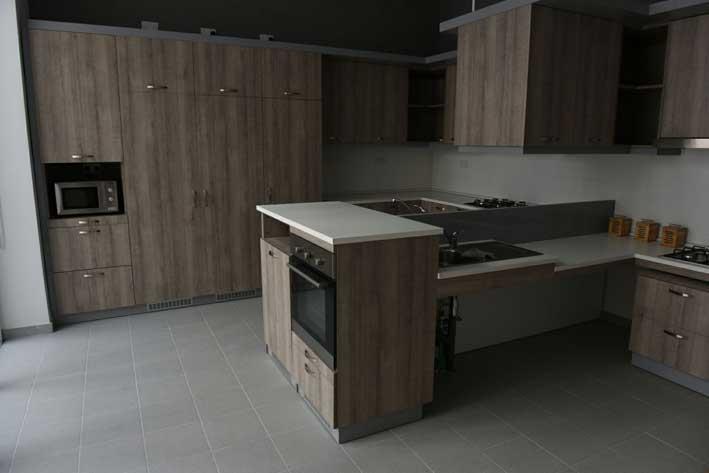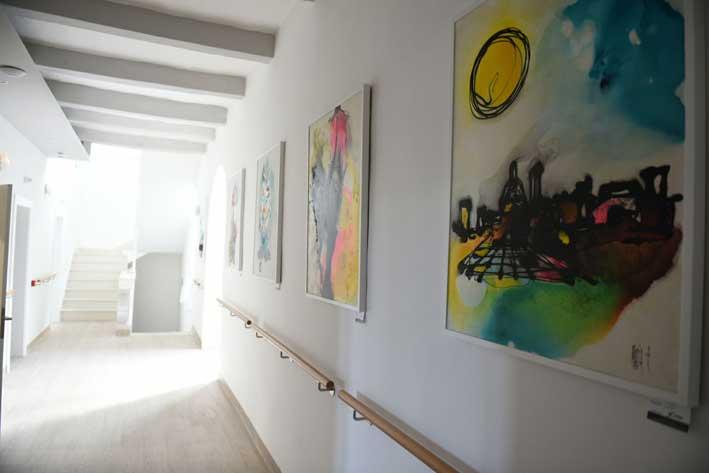The use of technology has been paramount in allowing patients to control their own televisions, literally with the blink of an eye. Bjorn also explains how ALS had given purpose to his life by enabling him to help others who suffer from this and similar conditions. His level-headed and realistic approach to the meaning of life - being a good person and living life to the full until the last breath - has made him what he is today.
From where did you get the idea for Dar Bjorn?
"Before Dar Bjorn, we used to provide services to people with ALS and similar conditions and found that many people didn't have anyone to take care of them, but people with conditions such as ALS need a dedicated carer. So we had a problem. I had seen some projects abroad, in the USA specifically, and I liked their ideas.
"One morning I woke up and thought: 'That's it, we need to do this. We need to offer somewhere for people with such conditions' and from there onwards it has been a continuous campaign of fundraising and planning.
For how many patients does the home cater, how many nurses and carers are there and what about the cost of maintenance and wages?
"The home can accommodate 13 patients, but we currently have 10. A team of about 50 people will be working, on a roster basis, to provide adequate care. The government will be funding the wages of carers and nurses, plus the maintenance costs associated with the running of the home. We also have doctors and other professionals for whom we will be financially responsible, but the government will be providing about €1 million a year towards the running of the home.

Do you believe this has been your biggest achievement?
I don't think of things as 'achievements', I commit myself to something and, of course, this means results. It has been a big project and it's great to look back at what we've accomplished. Of course you can always do more and bigger - we still have more to do.
"Everything is relative. You could save the world and probably say that is quite a big achievement, but the sky is the limit. Here - yes, we have achieved something. Step by step we began providing a service to patients, then medical equipment, then we set up research projects because there is still no cure for ALS so we need to invest more in research.
We offer the service not just to ALS patients but to those with other neurological problems as well. Ideally, it would be great to open more homes like this but we need to see what the requirements and demands of society are. This house is nearly full, so our next step is to concern ourselves with those who could not be given a place and to offer them help and support. Consequently, whether it's a home or some other option we need to offer, the issue needs to be resolved."
Do you believe Malta is sufficiently ALS-friendly?
Well, when it comes to disability access there are many areas that need improvements but, really, it's based on numbers and most people don't suffer from disabilities, so no one is going to bother. Of course, there is now an increased awareness and things have improved from the past. Places are more accessible than they used to be. However, I still find it challenging to even go into a shop: I wait outside 75 per cent of the time. People with a disability are still unable to do certain things because their environment has not been adapted to cater for their needs.
We need to create a degree of normality for people who are disabled: we need to achieve something that at least comes close. That's what we have tried to achieve in this home, a place in which they can do anything anyone else can do. Here, the technology we have installed means that with just the movement of one eye, you can control light, sound, television - everything. We built a smart home because people with ALS are disabled so they need to be able to control everything without having to move a muscle: everything - from turning on the television, computer or air conditioner or pulling the blinds up or down. All this provides normality to someone with disability, thus giving everyone the same opportunities.

It's been two-and-a-half years since you were diagnosed. Has your perspective on life changed and do you think you have changed?
Yes, a little bit. I am more focused now on what I do and am more determined. I look at things differently. Before, life was easier - more relaxed, you could say. However, when you take away all the rubbish that has consumed most of our lives, enjoying life and doing the most you can because you know time is limited, is vital. I have become more efficient, I have achieved more and I have been more useful to society. I've become completely focused on continuing with what I am doing here. Life is about doing good and bad - and everyone should just try to do more good, it's that simple.
What role has your family played in the last two-and-a-half years?
My wife is the person I spend most of my time with. Sometimes, when you have a condition like this, you feel that you're doing this on your own but then you stop and remember that your partner and family are also living through it. Of course, being around someone every day doesn't mean that you don't fall out and it's not always happiness and roses. But truly, to have someone with you, by your side, for whom you have so much respect, is priceless. I found the right person and she's still here. I can't ask for more.

What does your illness mean to you? What are your thoughts on the meaning of life?
ALS has been an entire journey - from learning that I had it, which was devastating because I couldn't understand it, to eventually discovering what I believe is the meaning of life. Now I believe it's about giving everything you've got to reach a goal in life. Nothing has given me as much satisfaction as what I am doing now.
Before, I went to work to earn money and pursue business and personal gains, which was enjoyable. However, creating solutions that will help others is a priceless feeling: it's something more beautiful and seeing the smiles on their faces makes it all worthwhile: it's something you can't describe.
Most people can't understand this, they go to work to earn as much money as possible and that's it. The rest of their time is spent on going out drinking, getting wasted, etc., which can all be fun - temporarily. Nevertheless, I have truly never had so much fun and satisfaction than I have now through helping others; you can't buy these feelings.

Knowing the situation you're in, and knowing that there's no cure for ALS, how do you manage to keep positive?
I'm not positive, I'm realistic. I know what my weaknesses are and I know what my strengths are - and I concentrate on them. I don't dawn on my condition too much. Sometimes, as we all do, I stop and think and I feel that my life is slipping away. Up until now I just focus on living and working on these projects. At the end of the day, there will come a time when we go to sleep and we won't wake up - and that's it. So my perspective has really changed on this: today I know that that day is coming sooner and I've accepted this and I am alive now, so I intend to live for the moment.
What's the one thing you would to pass down to your friends and family?
Don't complicate matters: keep things simple. Try to do something you love doing - interesting stuff - and think of others. Live a simple life; don't allow non-important matters to take over your life and become a problem when they're not. If everyone thought of someone else, the world would be a better place. It's a very practical idea: if everyone helped at least one person, the world's problems would be solved.